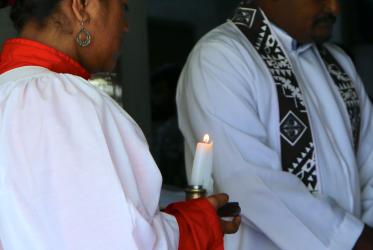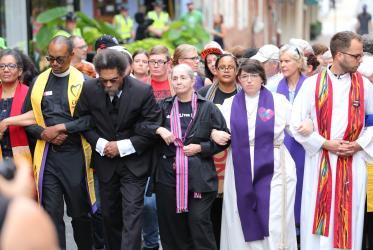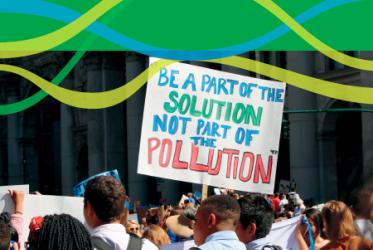11-12 September 2003
Ecumenical Centre, Geneva, Switzerland
Giving witness of the hope that is in us: our passion for the possible
I. Overview
Seventy of us representatives of churches, church-related agencies and ecumenical partners from social movements in different parts of the world gathered at the Ecumenical Centre in Geneva, Switzerland on 11 and 12 September 2003 for an internal encounter organised by the World Council of Churches (WCC) on the policies of the International Monetary Fund (IMF) and World Bank (WB).
The internal encounter had the following objectives:
- To elaborate on a common vision and coherent strategies within the ecumenical movement to address the policies implemented by the IMF and WB;
- To enable representatives from churches, agencies and partners from social movements to search for consistent and effective ways to promote ecumenical responses to the policies of the IMF and WB from the perspective of people in poverty; and
- To discuss the issues that have to be raised with the IMF and WB at the 2nd external encounter between the WCC, IMF and WB in Washington, D.C. on 28-29 October 2003.
This report affirms the spiritual, moral and ethical bases for churches? engagement with the IMF and WB, points out the challenges churches face in this process and highlights the main issues to be raised in the next external encounter between the WCC, IMF and WB.
II. The grounds on which we, as churches, enter into external encounters with the IMF and WB
The WCC had been invited by the IMF and WB to enter into a dialogue. Just as Jesus engaged with different personalities and authorities in His time, we, as churches and Christians, are open to constructive encounters and a genuine exchange of views with the IMF and WB. We bring into these external encounters a rich diversity of experiences and forms of witness. The WCC and the broader ecumenical movement represent a wide and far-flung global network that can contribute from concrete experiences at the local levels in many parts of the world. This strength and characteristic of the global ecumenical movement constitutes an important building block in the external encounters with powerful global institutional actors such as the IMF and the WB.
Testimonies and research findings from our sisters and brothers in Africa, Asia and Latin America show that the harsh economic measures imposed by the IMF and WB as "conditionalities" for providing loans, debt relief and bail-outs in times of crises as well as the unremitting flow of payments for debts often incurred by governments under illegitimate conditions are having far-reaching and adverse impacts on the basic human rights and survival of millions of impoverished and vulnerable people in these countries. In the external encounters with the IMF and WB, we must lift up the voices ? the "cries for life" ? of these people for whom God has expressed a preferential option. The point of departure in these external encounters should be the loving message of Jesus: that all should have life in all its fullness, here and now, and in the future.
As churches and Christians, we are called to give witness of the hope that is in us. This hope is the basis for our passion for the possible. Our rich ecumenical heritage of studies as well as concrete projects indicate that there are possible and viable alternatives to the currently unjust and unsustainable global political-economic systems and policies, both at the global and local levels. Thus, the claim that "there is no alternative" has to be rejected.
The spirituality of life, which is basic to our Christian faith, is intrinsically at odds with prevailing political-economic arrangements and policies that are creating and exacerbating human suffering. Therefore, we believe that, eventually, nothing less than a fundamental shift in political-economic paradigms is necessary for humankind to become instruments of God in striving for the vision of just, participatory and sustainable communities.
In summary, as the document "Lead us not into temptation" points out, we, as churches and Christians, are called to:
- Prophetically criticise injustices and create new visions;
- Courageously resist political and economic powers;
- Advocate for reforms and fundamental changes so that political and economic structures serve life; and
- Live out alternatives of God?s kingdom.
II. Challenges on the road
In the external encounters with the IMF and WB, we face several challenges:
There is considerable confusion about language and concepts used:
- we are looking at the same things but are seeing different things;
- we are using the same concepts and terms but are meaning different things; and
- we are listening to the same words but are hearing different things.
In the external encounters, more clarity and transparency are needed regarding concepts used and the way in which they are operationalised.
- No unwarranted legitimacy should be given to the policies of global institutions which run counter to our basic convictions. This requires an open and straightforward attitude from us as well as from the IMF and WB as participants in the external encounters.
- The participants in the external encounters should carefully assess which ?arenas? for discussion (global, regional, national, global) are the most useful and appropriate for obtaining the desired results and objectives with which they enter into dialogue.
- The participants in the external encounters should guard against claiming absolute moral, spiritual or technical authority and rejecting each other?s views and convictions as either unrealistic or ethically objectionable.
- Moreover, if we are going to convincingly challenge the IMF and WB in the external encounters, then this must be complemented with internal appeals for consistency in terms of levels and styles of consumption and production within our churches.
III. Issues to be brought forward in the 2nd WCC-IMF-WB encounter
The 1st WCC-IMF-WB encounter from 13-14 February 2003 had identified a number of issues to be raised in the next WCC-IMF-WB encounter from 28-29 October 2003, as follows:
- Participation of civil society in development. The issue of people's participation in development policy-making, implementation, monitoring and evaluation will be looked at in terms of roles and processes with emphasis on the external debt problem and the Poverty Reduction Strategy Papers (PRSP) approach of the IMF and WB.
- Institutional governance and accountability. The need for more democratic and representative governance of international institutions such as the IMF and WB and accountability for their development policies and actions will be discussed.
- Respective roles of public and private sectors in development. Here, the roles/responsibilities of and interplay between states and markets in development policy and poverty eradication efforts will be explored. The question of how to deal with governments lacking in legitimacy will also be tackled.
- Challenges of globalisation. The following questions will be addressed, among others: What are the dynamics of the globalisation process? Who are the key actors? What are the impacts in terms of growth and equity?
The internal encounter affirms the need for a critical exchange with the IMF and WB on the issues outlined above and recommends that the concern on privatisation be discussed under "respective roles of public and private sectors in development" and the question on possible and viable alternatives be added under "challenges of globalisation."
Regarding "institutional governance and accountability," it was observed that, during the internal encounter, the IMF and the WB recognised the dominant position of the rich countries ("shareholders") in their institutions. This seriously compromises the democratic nature of these institutions.
Furthermore, we recommend the inclusion of two additional issues for discussion in the forthcoming external encounter, as follows:
- Responsibility. Who takes responsibility for grave mistakes made by major actors such as the IMF and WB in the course of time (e.g. odious debts)?
- Conditionality. Conditionality used by the IMF and WB reflects the prevailing political-economic power relations and ideologies, and is contrary to the stated objectives of their policies as outlined in the PRSP framework.
IV. Working together towards just, participatory and sustainable global political-economic systems
The internal encounter yields inspiring inputs not only for the forthcoming WCC-IMF-WB encounters, but also for the varied ecumenical initiatives on economic justice such as ongoing debt cancellation campaigns in adherence to the Jubilee tradition and the "Trade for Peoples" campaign, among others. We bring these fruits with us in our continuing work towards the building of just, participatory and sustainable global political-economic systems that serve life for all.



